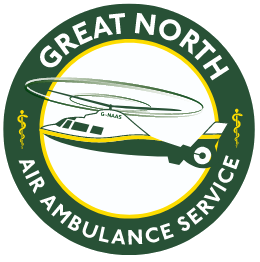Delivering blood and plasma transfusions has taken our care to another level and resulted in lives being saved as a direct consequence.
The introduction of the blood on board service has allowed GNAAS to carry out roadside blood and plasma transfusions on patients at the scene of a life or limb threatening injury in North East, North Yorkshire and Cumbria.
Team effort
The pioneering scheme is a collaboration between the Newcastle Hospitals, GNAAS and volunteers from the Cumbria and Northumbria Blood Bikes and was devised by Dr Rachel Hawes OBE, army reservist, consultant in anaesthesia and prehospital emergency medicine at the Royal Victoria Infirmary (RVI) and doctor at GNAAS.
What blood type do we use?
The transfusions we give are purely O negative red blood cells. This is known as the ‘universal blood type’ because people of any blood type can receive it, and it is used most often in cases of trauma, emergency, surgery and any situation where blood type is unknown.
During the transfusion, the red blood cells replace lost blood and ensure that the oxygen carried by the new blood gets to all the major organs.
In addition to this, defrosted fresh frozen plasma is also administered, as it provides vital clotting components to help blood clots to form and to stop bleeding.
Giving a balanced transfusion, using equal volumes of red blood cells and plasma, means more patients arrive at hospital with their bleeding under control and minimal abnormal clotting. It’s also led to patients requiring fewer transfusions in hospital.
How is blood and plasma delivered?
On a daily basis, a volunteer from both Northumbria Blood Bikes and Blood Bikes Cumbria collect a cool box – donated by the Henry Surtees Foundation – from the RVI’s blood laboratories.
The cool boxes are then transported to the two GNAAS bases – Progress House, Eaglescliffe and Langwathby, near Penrith.
The cool boxes keep two units of blood and two units of plasma cool for up to 48 hours and if not used, they are returned to the RVI to be used during surgery and other procedures in the hospital.
Dr Rachel Hawes awarded OBE
Dr Rachel Hawes was the driving force behind the introduction of blood and plasma transfusions onto our service.
As an officer in the army reserve, Rachel used her experiences gained during military deployment in Afghanistan as the basis for the idea for the scheme and adapted this to a system suitable for the North East and Cumbria.
In 2018 she was awarded an OBE in recognition of her pioneering work and we are all extremely proud of her.
First patient to benefit from pre-hospital blood and plasma transfusion in the North
John Beaumont received the North’s first pre-hospital transfusion of blood and plasma, and has left friends and family “flabbergasted” at his remarkable recovery.
John was riding his Suzuki GSX-R 600 motorcycle on his way to work in Kendal when he was involved in a collision with a car which left his life hanging in the balance.
He sustained a shattered face, broken femur, snapped forearm, broken shoulder blade, fractured collar bone, five spinal fractures, four neck fractures, a broken leg, nerve damage and a brain herniation.
He was treated at the roadside by GNAAS and was put into a medically induced coma by the doctor-led team. One unit of blood and one unit of plasma were administered before he was airlifted to the Royal Preston Hospital where he spent four weeks in a coma.
He said: “I have no doubt that I wouldn’t be here without GNAAS. It’s phenomenal.”
Read moreKeep us flying
Blood is just one part of our critical care toolkit. With your support, we can continue to deliver this cutting edge service throughout the region.

